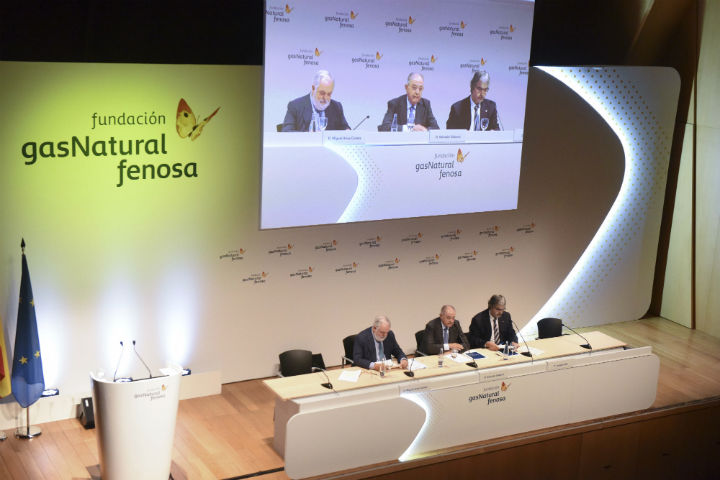Energy efficiency and natural gas are key to achieving EU emissions reduction targets
A panel of experts gathered in Barcelona today examined the role played by natural gas in the European sustainable growth strategy through such initiatives as cogeneration in industry and the residential sector.
During two round-table debates, the meeting organised by the Gas Natural Fenosa Foundation also discussed the role played by natural gas in land-based and maritime transport.

Earlier today in Barcelona, the Chairman of GAS NATURAL FENOSA, Salvador Gabarró, the EU Commissioner for Energy and Climate Action, Miguel Arias Cañete, and the General Secretary of the Presidency of the Regional Government of Catalonia, Joaquim Nin, opened the conference entitled “Emissions, Energy Efficiency and Natural Gas”,organised by the Gas Natural Fenosa Foundation.
The seminar, which was closed by the Managing Director of Retail Energy Business of GAS NATURAL FENOSA, Daniel López Jordà, and the General Manager of the Gas Natural Fenosa Foundation, Martí Solà, was attended by more than 350 professionals from the world of business, engineering, universities and public administration services.
The European Union is studying profitable ways to ensure that the European economy is more climate-friendly and that it consumes less energy. Energy efficiency and the use of natural gas are essential aspects of the European sustainable growth strategy and one of the most profitable ways to strengthen energy supply security and reduce greenhouse gas emissions.
In this regard, the Chairman of GAS NATURAL FENOSA, Salvador Gabarró, said in his speech that “natural gas can play a decisive role in the EU energy mix to ensure a more carbon-free system through such initiatives as cogeneration in industry and the residential sector.” According to the report entitled A more sustainable energy model for Spain in 2050 drawn up by Deloitte, a smart and flexible transition is needed that can guarantee compliance with the long-term targets given that the new technologies to stem from decarbonisation still have a long process of further development ahead.
Hence, Salvador Gabarró highlighted the key role for natural gas in the electricity generation mix and as a back-up for renewable energies, and underlined “the role that natural gas can play in reducing emissions from land-based and maritime transport, which is another of the main focal points for atmospheric pollution”.
Energy efficiency and emissions
The first debate – on energy efficiency and emissions – was moderated by the executive advisor to the Gas Natural Fenosa Foundation, Manuel Ludevid, and included the Director for Energy Markets and Security of the International Energy Agency, Keisuke Sadamori, the professor from Universidad Pompeu Fabra, Jordi Sunyer, and the member of COGEN Europe, Óscar Cubero.
During their speeches, the speakers presented the global and European trends in energy efficiency while offering information on the evolution of energy efficiency by sector and by country, as well as its quantified impact on emissions reduction. They also raised the topic of the health effects caused by urban pollution.
They subsequently reviewed the contribution being made by cogeneration to emissions reduction and explained that Spain could achieve annual electricity generation of some 120 TWh/year with cogeneration if the right stimulus measures were implemented. However, they highlighted a lack of firm support for this technology as reason for the suspension of power plants and a significant fall in electricity generation from cogeneration.
Natural gas and emissions reduction
The second debate – on natural gas and emissions reduction – was moderated by the Chairman of Sedigas and General Manager of Regulated Businesses of GAS NATURAL FENOSA, Antoni Peris, and included the General Secretary for Mobility of the International Automobile Association, Andrew Mckellar, the Chairman of Balearia, Adolfo Utor, the Chairman and CEO of Wärtsilä, Jaakko Eskola, and the CEO of Iveco Spain, Jaime Revilla.
The speakers explained that natural gas is the only economically profitable alternative to conventional fuels in heavy transport and that it is the solution for the environmental problem in the short term for cities. Furthermore, LNG is showing itself to be the fuel that will lead a new era in maritime transport. In fact, Spain is a world leader in terms of knowledge and use of LNG technology, which could lead the country to export products and services, with the corresponding positive impact on GDP and employment.
The advantages of natural gas include increased energy diversification by reducing dependency on oil. It has environmental advantages because it represents a carbon dioxide (CO2) emissions reduction of up to 20%, thus contributing to alleviating the greenhouse effect. Furthermore, it reduces nitrous oxide (NOx) emissions by up to 85% and avoids the emission of sulphur oxides (SOx) and suspended particulate, improving air quality. It also presents economic advantages: the cost of switching to natural gas can be recouped in 1 year for a light vehicle, in 2 years for a heavy vehicle and in 5 years for a medium-distance ferry.
Barcelona, 19 September 2016.
Share